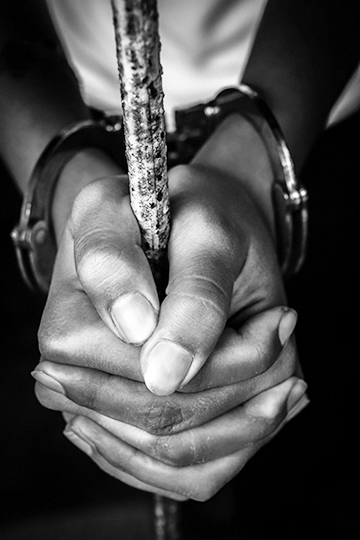 Armchair analysts are rolling up their sleeves for this one. What is the prognosis for the mental and emotional futures of children born into captivity and later freed?
Armchair analysts are rolling up their sleeves for this one. What is the prognosis for the mental and emotional futures of children born into captivity and later freed?
Canadian Joshua Boyle, his American wife Caitlan Coleman, and their three young children were given their freedom last Wednesday (October 11, 2016) after being taken hostage in Afghanistan by the Haqqani network--a Taliban-linked terrorist organization--and held as prisoners in Pakistan for the last five years.
At the time of their confinement in October 2012, Coleman was pregnant with the couple’s first child, a boy—due in December of that year. Subsequently, all three children were born in captivity—a second boy in 2015 and a girl this year, just a few months ago.
Joshua’s parents, Patrick and Linda Boyle, received a number of videos documenting the young family’s confinement and were shocked at their contents. CTV News reported the grandparents released a written statement last year describing the emotions they felt seeing their grandsons in such dreadful surroundings while hearing their son, Joshua, dragging his own leg chains around the tiny ‘living’ space.
CBC News reported the family was freed by Pakistani special forces in a movie-like gun battle and car chase. Each day since the family of five arrived safely last week on Canadian soil, Joshua Boyle, through media interviews, has exposed more details of their terrifying five years away.
And therein lies the preponderant question: after enduring such a horrifying existence—albeit the only reality any of the children have known—can Boyle’s and Coleman’s progeny be reintegrated into North American society and go on to experience a successful future with positive mental health?
In their 2013 article for the American Psychological Association (APA), Adjusting to life after being held hostage or kidnapped, US psychologists Raymond Hanbury, PhD, ABPP, and David Romano, PhD wrote that “many hostage survivors are faced with transitioning from conditions of isolation and helplessness to sensory overload and freedom. This transition often results in significant adjustment difficulties.”
Other specialists in the field of psychology note inconclusive mental health predictions for these children right now given the randomness of specific aspects of the family’s five years of terror. Indications are that the three children were never taken away from the parents’ care but they did, nevertheless, witness their parents subjected to their captors’ violence—including sexual abuse of their mother.
Four days after their release, an article by CNN reporters Paula Newton and Kelly McCleary quoted Joshua Boyle at the time of the gun fight and car flight to freedom. They wrote that Boyle realized his son had not seen sunlight until that very day.
While it is impossible to professionally evaluate these three children’s psychological and emotional well-being after only one week of freedom, their father was able to comment to news media on what he has already noticed. In response to emailed questions from CBC News senior correspondent Susan Ormiston, Boyle said of his eldest child, Najaeshi Jonah, 4, “. . . freedom seems to have cured half his ills instantly . . .". By contrast, he also added that the boy is “terrified to leave the house . . . “.
Middle son Dhakwoen Noah, 2, is “nearly as distressed as he was in prison’, Boyle noted. He believes his middle child finds memories in objects around him: slamming doors mean cell searches; cameras are for hostage videos; and pens remind him of the drug-filled syringes his parents endured. The baby, Ma’idah Grace, seems afraid most of the time, Boyle wrote.
In their APA article, Hanbury and Romano temper the emphasis psychologists place on the importance of time for freed hostages to recover from the trauma--with emphasis on the resilience of the human spirit and one’s ability to triumph above such devastation.
Ongoing symptoms of stress, such as disturbed sleep, may require the help of mental health professionals—for the children and parents alike. The website of the U.S. Department of Veterans Affairs explains that until recently, little was known about Posttraumatic Stress Disorder (PTSD) in the very young. Now, research shows the importance of the bond between parent and child and the influence this relationship has over how a child responds after experiencing traumatic events.
Although most children have symptoms following trauma, only a few will go on to have PTSD. And diagnosing PTSD in children can be difficult even though the definition of trauma used to diagnose it is specific. By definition, one must feel “fear, helplessness, or horror” for an event to be considered traumatic. Does this occur in a very small child? Often, young children are unable to put words and feelings to an event they encountered.
Commenting on the Boyle-Coleman children in an article for The Canadian Press, Phil Ritchie, psychologist and clinical lead at the in-patient psychiatry unit of the Children's Hospital of Eastern Ontario, said he believed the parents would have done their best to shelter their children as much as possible from the trauma and maintain a sense of family normalcy.
Clearly, no amount of speculation can truly predict how these children’s mental health and wellness will play out, but for the professionals and for the armchair psychologists, they will indeed be children to watch.
References
Hanbury, R., PhD, ABPP, and Romano, D., PhD (July 2013). Adjusting to life after being held hostage or kid-napped. Retrieved from American Psychological Association. http://www.apa.org/helpcenter/hostage-kidnap.aspx
McQuigge, M., (October 12, 2017). Boyle kids face long road to recovery but healing possible: experts. Retrieved from The Canadian Press via CTV News. http://www.ctvnews.ca/canada/boyle-kids-face-long-road-to-recovery-but-healing-possible-experts-1.3630010
Ormiston, S., (October 14, 2017). Freed hostage Joshua Boyle says children adapting to '1st true home'. Retrieved from CBC News. http://www.cbc.ca/news/world/boyle-coleman-former-captives-return-to-canada-1.4355358
U.S. Department of Veterans Affairs. Very Young Trauma Survivors: The Role of Attachment. Retrieved October 2017. https://www.ptsd.va.gov/public/family/very_young_trauma_survivors.asp